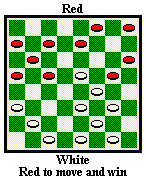Return to my Checkers pages
Return to my home page
I took 4th place (three-way tie for 3rd, taking 4th and $74 on tie-break) in the 1996 Inter-District (I-D) Playoffs. This is the National Championships of Checkers-by-Mail. We began in January 1996, and I played 42 games, simultaneously. The deadline was November 30, and I finished my last game on November 23. I won two matches, lost one (to Al Lyman), and drew the rest. I won 7 games, lost 5, and drew 30.
Al Lyman has won the tournament, and the National Title, with Arnold Cook taking second. The final standings (scores=wins,losses,draws):
| place | name | from | matches | games | prize |
| 1 | Al Lyman | Kansas City, MO | 7-0-0 | 9-0-33 | $222 |
| 2 | Arnold Cook | Woodbury, TN | 4-1-2 | 9-2-31 | $148 |
| 3 | Bert Vanderpool | Athens, PA | 2-1-4 | 8-3-31 | $111 |
| 4 | Jim Loy | Bozeman, MT | 2-1-4 | 7-5-30 | $74 |
| 5 | Thomas Sheehan | Bronx, NY | 3-2-2 | 7-4-31 | $37 |
| 6 | Lester Balderson | Richmond, VA | 2-3-2 | 5-7-30 | |
| 7 | Garry Maddux | Greensburg, IN | 1-6-0 | 3-13-26 | |
| 8 | Luther Stubblefield | Blanchard, OK | 0-7-0 | 2-16-24 |
Checkers-by-mail is played on post cards. In the I-D tournament, each player plays 6 games, simultaneously, against each of the other competitors. Each player chooses one opening and the tournament director chooses one opening, and both players play both sides of these three openings. Normally, difficult openings are chosen. In order to qualify for the I-D tournament, a player must win his district mail-play tournament (or take second place if there are several entrants in the district tourney), the previous year.
I began the tournament with a blunder. The cook (new move in the opening) that I had been preparing for a couple of years, and had spent hundreds of hours on, turned out to be one that everyone was likely to avoid. So, instead of an easy win in this opening, I am likely to get quite a few book draws. I should have noticed that. The cook is shown below.
If you need it to read this article, please print out the numbered board.

The cook was originally played against me by Eddie Moore. It wipes out a full page of analysis in Churchill's Compilations. But, the losing move will be very rare. Here is the game:
E. Moore - J. Loy
11-15 22-17 9-13 17-14 (The Boston. 24-20, the
Wagram, is probably better) 10-17 21-14 8-11 25-21? (23-19, transposing into
the Laird & Lady, or 24-19 are better) 15-18 24-19 6-9 28-24 (There may be
other moves) 11-16 29-25 1-6 14-10 7-14 26-22 2-7! 22-15 [diagram]
From the diagram: 14-18! (Moore's cook) 23-14 16-23 27-18 7-10 14-7 3-28 18-15 (31-27, 25-22, and 30-26 seem to lose) 4-8 25-22 (31-27 9-14! RW) 9-14 31-27 (22-18 seems to lose) 14-18 30-25 12-16 21-17 6-9 (8-11 may be easier) RW

The opening chosen by the director (Earl Hangen) was opening #45A (10-14 22-17 11-15), which is shown in some books as 11-15 22-17 10-14. This should be a fairly difficult opening for Red. But, some better attack will have to found, because of the following defense. This draw was previously published, but is now widely known to be an easy draw:
10-14 22-17 11-15 17-10 7-14 24-19 15-24 28-19 8-11 25-22 6-10 (the same as 11-15 23-19 9-14 27-23 8-11 22-18 15-22 25-9 5-14 26-22? C.R.=colors reversed) 22-18 [diagram]
From the diagram, Red voluntarily destroys his own back row, to achieve this easy draw: 9-13! (Previously, 11-16 was more popular) 18-9 5-14 23-18 14-23 27-18 2-6! 18-14 10-17 21-14 6-10* 14-7 3-10.
The original game is Sheehan-Reed, 1989 I-D, which continued for a few more moves. Red's position looks bad, but White will have to destroy his own back row, soon. Three of my draws followed these published lines: 32-28 11-15 29-25 15-24 28-19 4-8 25-22 8-11 22-18 (31-27 draw, Childers-Fortman, game #3, World Championship Mail Match) 1-5 18-15 11-18 19-16 12-19 26-23 draw, from Childers' notes on the Childers-Fortman game.
I am beginning to pay attention to some of the flaws in my mail play. The list of cooks that I have, seems to be inadequate. Most of them are either well-known by now, or unlikely to come up in real play. I did introduce several minor cooks in this tournament. They made some of these games interesting. But one resulted in a loss and one scored a win, the rest have resulted in draws. Two of my wins were the result of losing innovations (probable typos) from two of my opponents. My actual play was fairly superficial in some situations. This resulted in quick losses when a tough defensive effort was called for.
The tournament took a lot of my time. This seems to be the true secret to mail play. The amount of research and analytic effort necessary at this level is very great. Using a computer is allowed in checkers-by-mail. But, the computer turns out to be mainly a means of forcing a player to use huge amounts of time and effort.
Al Lyman tells me that I have to work on the newest and most difficult openings, as that is where the important cooks will be found. I want to have cooks in all of the openings, to keep opponents worried while I try to beat them in the tougher openings. But, he's probably right.